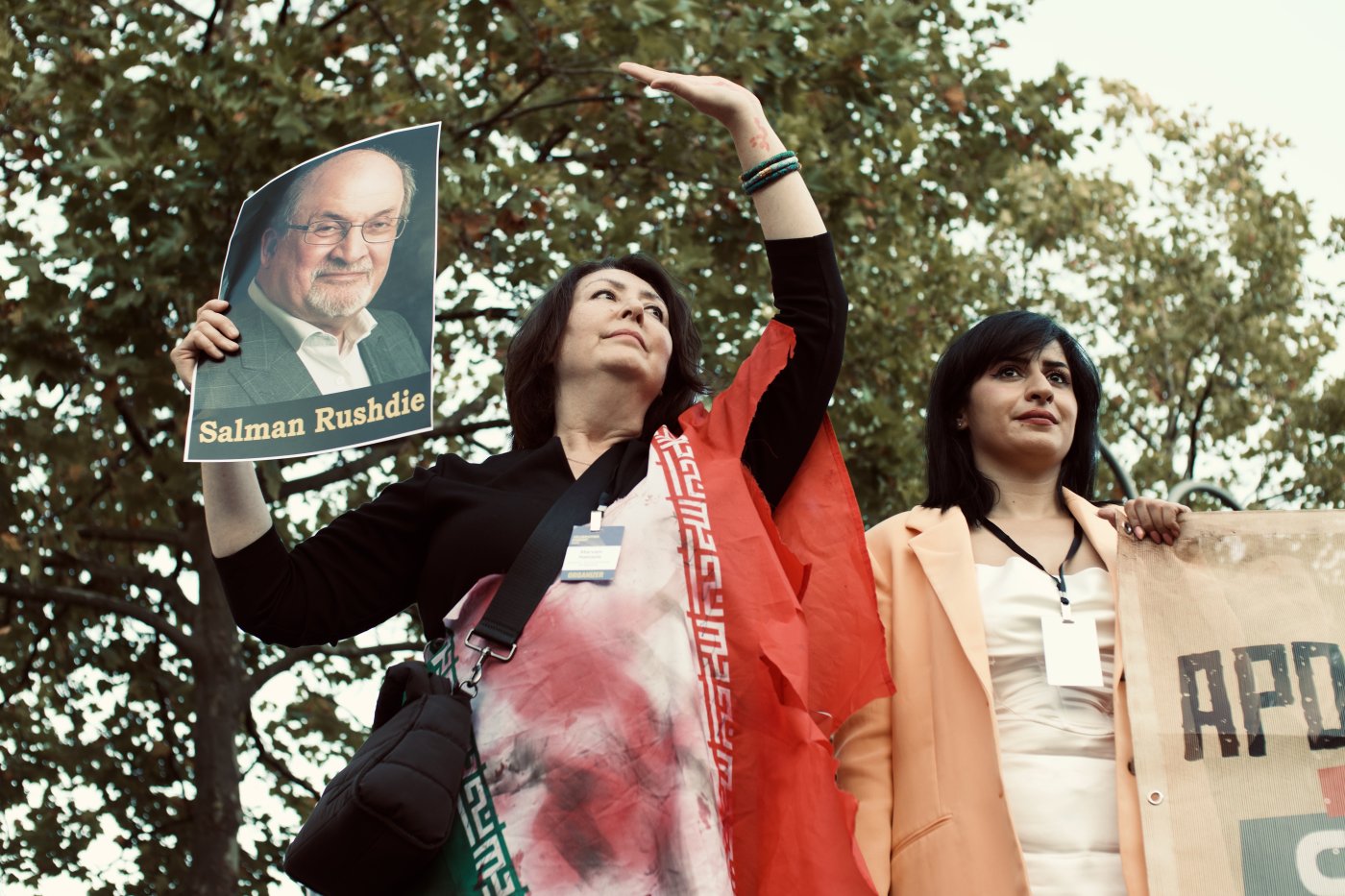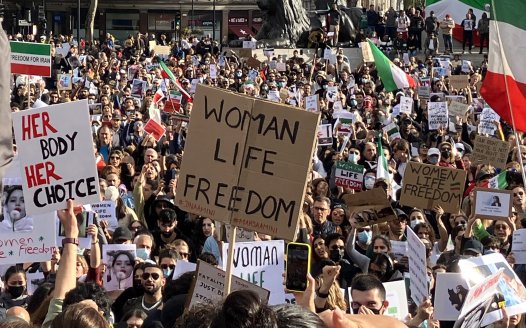Salman Rushdie and the women’s revolution in Iran are linked
Posted: Tue, 8th Nov 2022 by Maryam Namazie
There is a direct link between the threats and violence faced by Salman Rushdie and that faced by generations of women and men in Iran, says Maryam Namazie.
Salman Rushdie's agent has confirmed that the courageous writer has lost sight in one eye and the use of one hand after a brutal attack whilst he was preparing to speak at an event on asylum for writers.
The attack in New York state on August 12th has been a stark reminder that even decades after Ayatollah Khomeini's fatwa against Rushdie and his book The Satanic Verses, the writer remains unsafe to write and to speak.
After all these years, it is still unimaginable that someone, somewhere, can be attacked or killed for their words and expression. And that for many, accusations of causing offence, hurting fragile sensibilities and of 'Islamophobia' are enough to justify loss of life and limb.
In this topsy turvy worldview, words are harmful, violence justifiable. It's the age-old victim blaming in defence of the powerful at the expense of those who challenge the sacred and taboo, and dare to dissent.
Infuriatingly, after all these years, those issuing or supporting threats of violence face little consequence even though incitement to murder is a crime.
To give an example from Britain, Iqbal Sacranie, who had said "death, perhaps, is a bit too easy for [Rushdie]," was knighted by the British government in 2005.
Meanwhile, officials of the Islamic regime of Iran continue to travel with ease and without fear of prosecution. Only a few days after its morality police reportedly beat Mahsa Amini to death for 'improper' hijab, Iran's president Ebrahim Raisi was given a visa to address the United Nations General Assembly – in New York, no less. The Iranian regime, a regime of femicide, even sits on the UN Commission on the Status of Women.
Since Raisi's UN visit, many more protestors have been beaten, disappeared and killed using weapons of war. According to human rights groups, over 300 protestors have been killed, many of them children. The real numbers are higher. Over 14,000 have been arrested, including two women journalists who first broke the news of Mahsa Amini's death. An official of the regime has stated that the average age of those arrested is 15. A thousand have already been charged in summary kangaroo courts. Some have been issued death sentences for 'enmity against god.'
Clearly, there is a direct link between the decades of threats and violence faced by Salman Rushdie and that faced by generations of women and men in Iran. It is the Islamic regime of Iran which today is faced with a women's revolution that aims to end theocracy once and for all.
The veil, which since its imposition has been the most visible symbol of Islamic rule, is now the target and symbol of a women's revolution, led by a brave Generation Z that refuses to back down and has no illusions about Islamic rule. Their main slogans are: 'Woman, Life, Freedom,' 'We don't want an Islamic state,' and 'We don't want an anti-woman state.'
Just as the rise of the Islamic regime in Iran saw a corresponding rise of fundamentalism everywhere, the end of this regime via a women's revolution would herald a new dawn in Iran, the Middle East and the world. This regime came in by imposing the veil with acid attacks and violence. It will come to an end with free women burning and removing their veils.
Despite the ongoing protests in the streets of Iran and across the globe, western governments continue with business as usual, making only empty condemnations.
Pressure on western governments to stop relations with the regime of sex apartheid is one of the important ways in which secularists and freethinkers can defend the women's revolution as well as brave dissenters like Rushdie.
A banner at one of the protests in support of Iran's revolution sums it up perfectly:
"To the world leaders. Iranian women do not need you to save them. They only need you to stop saving their murderers."
In 2006, 12 writers (including Rushdie and I) signed a Manifesto against Totalitarianism, which says:
"We refuse to renounce our critical spirit out of fear of being accused of "Islamophobia", a wretched concept that confuses criticism of Islam as a religion and stigmatisation of those who believe in it.
"We defend the universality of the freedom of expression, so that a critical spirit can exist in every continent, towards each and every maltreatment and dogma.
"We appeal to democrats and free spirits in every country that our century may be one of light and not dark.'
The women's revolution in Iran has allowed us all to fathom another Iran and world free from fundamentalism.
Supporting it, defending it, and safeguarding its gains can help make this century 'one of light and not dark.'
Image: Maryam Namazie (left) and fellow activist Rana Ahmad by Ayman Ghoujal.
This piece was written for MIZ to be published in German.
What the NSS stands for
The Secular Charter outlines 10 principles that guide us as we campaign for a secular democracy which safeguards all citizens' rights to freedom of and from religion.








